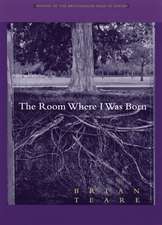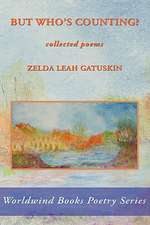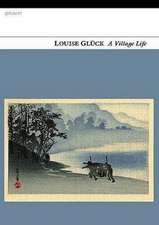Sor Juana's Love Poems
Autor Sor Juana Ines De La Cruz Traducere de Joan Larkin, Jaime Manriqueen Limba Engleză Paperback – 25 iun 2003
These exquisite love poems, some of them clearly addressed to women, were written by the visionary and passionate genius of Mexican letters, the seventeenth-century nun Sor Juana Inés de la Cruz. In this volume they are translated into the idiom of our own time by poets Joan Larkin and Jaime Manrique. Some of them are rooted in Renaissance courtly conventions; others are startlingly ahead of their time, seemingly modern in the naked power of the complex sexual feelings they address.
Preț: 71.93 lei
Nou
Puncte Express: 108
Preț estimativ în valută:
13.76€ • 14.22$ • 11.45£
13.76€ • 14.22$ • 11.45£
Carte disponibilă
Livrare economică 27 februarie-13 martie
Preluare comenzi: 021 569.72.76
Specificații
ISBN-13: 9780299187040
ISBN-10: 0299187047
Pagini: 88
Dimensiuni: 152 x 229 x 8 mm
Greutate: 0.14 kg
Ediția:1
Editura: University of Wisconsin Press
Colecția University of Wisconsin Press
ISBN-10: 0299187047
Pagini: 88
Dimensiuni: 152 x 229 x 8 mm
Greutate: 0.14 kg
Ediția:1
Editura: University of Wisconsin Press
Colecția University of Wisconsin Press
Notă biografică
Joan Larkin has published the poetry collections Housework, A Long Sound, and Cold River. The editor of numerous anthologies, she is the recipient of two Lambda Literary Awards for Poetry. She teaches poetry writing at Sarah Lawrence and New England Colleges. Jaime Manrique is the author of the memoir Eminent Maricones: Arenas, Lorca, Puig, and Me, also published by the University of Wisconsin Press, the novels Twilight at the Equator, Latin Moon in Manhattan, and Colombian Gold, and two poetry collections, My Night with Federico García Lorca and Tarzan, My Body, Christopher Columbus. He lives in New York City and is an associate professor in the MFA program at Columbia University.
Descriere
These exquisite love poems, some of them clearly addressed to women, were written by the visionary and passionate genius of Mexican letters, the seventeenth-century nun Sor Juana Inés de la Cruz. In this volume they are translated into the idiom of our own time by poets Joan Larkin and Jaime Manrique. Some of them are rooted in Renaissance courtly conventions; others are startlingly ahead of their time, seemingly modern in the naked power of the complex sexual feelings they address.












